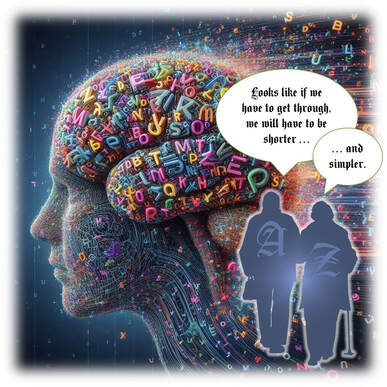|
You wanted to walk with me, or rather, help me walk, didn’t you? You were even willing to push my wheelchair if I retuned in that state, weren’t you? The voice was familiar. Instinctively, I looked around. There was no one. Just darkness. I had stepped out for my walk earlier than usual. The streetlights were out, the sun wasn’t yet. Please don’t get spooked. I had also wanted to be with you. When they did not let me get away from the bed and all the tubes. And after. That’s why I decided to walk with you, just this once. Let’s just walk and talk. At least you do the walking, and we’ll think together. Sorry you had to be in the hospital for so long. The family tried their best to get you back. I am sure they did. But I had left me a few days before they took me out of the hospital. They just held on to the body. Were you in pain? After some time, it is no longer about me. It is about who is there, who thinks is responsible for me. What works for all. You may call it helping me fight. Or you may think it is torture by delegation. Would you have preferred to come home sooner? And do what? Trouble everyone at home? There everyone listened to what one doctor said. Here everyone would have been a doctor. You would run out of time and patience. Like it or not. And my journey would have just gone on, regardless. I flinched when they placed you on the hard floor. Then moved you this way and that to adjust the sheets and to place the things for the prayer. You were too much into the body that was no longer me. Suppose they took a call and took my stuff out of the body. Stuff someone else could use. Then moved what was left for the students to study. Would you have preferred that? Maybe that’s best for all? At least that’s what I am asking for in my will. Good for you. Take what you want and play with the rest. You know any time, now or then, what matters is if I am in you and you in me. In heart. In thoughts. Beyond rituals. Beyond expectations. But rituals are important. For generations. Respecting the memory. You are divine when you are no longer human. Strange! I could not place most of the people who paid obeisance to my body. Would they have come to feed me or even to just sit and talk with me before I had crossed over? And here they were, so solemn. Nice of them to come. Yet, somehow funny, thought. The sun is rising. Time for me to go. By the way, a sweet I used to enjoy a long time ago. I have been wanting to give it to you. Now that I have crossed the threshold, I can’t. Let me see. Then the blaring horn and blinding headlights of a wayward car broke the spell. The dawn was stretching and yawning. I would have dismissed it as a waking, walking dream, if my wife had not asked me after she finished putting away the veggies I had bought as usual. “What is this? Did you buy this? Or does this belong to someone else? Looks like some sweet.” Image by kordula vahle from Pixabay
0 Comments
The government reportedly plans to encourage teachers to teach children in the latter's local dialect to make them feel at home when they start school. One wonders if this has anything to do with findings from Australia or, more specifically, Murrinhpatha. Murrinhpatha is an Australian aboriginal language spoken by some 2,500 residents of Wadeye, a town in the northwestern coast of Australia. A picture shows a falling man whose leg is about to enter the gaping jaws of a crocodile. How would you describe the image? If you spoke Murrinhpatha, your answer would have been any of these: Crocodile might bite person; Crocodile one person will bite; Man crocodile might bite; Young man bit crocodile; Crocodile bit. And each answer would have been right from the speaker’s perspective. Writes Christine Kenneally in her story in Scientific American that this was one of the experiments conducted by a team led by Rachel Nordlinger, Director of the University of Melbourne's Research Unit for Indigenous Language. The Murrinhpatha way With minimum distracting instructions before the test, they asked 46 Murrinhpatha speakers to look at the image. An infrared tracker recorded their eye movements as they looked at the scene and spoke. The scientists found that the Murrinhpatha speakers were looking evenly and rapidly at both the characters on the image. In scientific terms, they were doing some tremendous amount of relational encoding in the first 600 milliseconds. As Nordlinger put it, “what a speaker looked at first in a sustained way after the initial 400-millisecond window was the thing that they mentioned first.” Not that it was a rule; some focused on the second element. The more important finding was that every individual Murrinhpatha speaker had more than five and half different ways of arranging the subject, verb and object in a sentence. In all, they produced 10 possible word orders. What a language! Murrinhpatha is what linguists call “polysynthetic”. A single word in this language may express action, participants, ownership and intention using a single word. The actors and the action are all entwined. For example, how would you say in the language you are comfortable with that “he was going through our bags stealing from us”? In Murrinhpatha, you would have used a single word: mengankumayerlurlngimekardi. As the language has a free word order, subjects, verbs and objects can occur in any position in a sentence. In practice, this means the two-year-olds of Wadeye are wielding massively complex words while most of their contemporaries elsewhere are grappling with the connection between A and Apple. Murrinhpatha divides all nouns into 10 different classes. These are: familiar humans; all other animate beings; vegetables and other plant-based foods; language and knowledge; water; place and time; spears (used for hunting and ceremonies); weapons; inanimate things; and fire. (And to think that I had enough trouble with learning English parts of speech in school!) Secret of survival How did such a language survive? And how does one who speaks Murrinhpatha survive today? Just 200 years ago, at least 300 languages were spoken by people in Australia, most of those having descended from a protolanguage spoken some 6,000 years ago. Now, only 13 are learnt by children as their first language. After Wadeye was established as a mission, children were taken and “incarcerated” in a boarding school. Speaking the native tongue invited punishment, naturally leading to the gradual demise of several local languages. How come children in Wadeye still speak Murrinhpatha? According to an elder who spoke to Nordlinger, “We just used to whisper”, thus keeping the language quietly alive. Some of the locals learned Murrinhpatha from their elders and later went on to learn English in school. Now, English helps them talk to outsiders and get good jobs. However, they owe their culture and their worldview to Murrinhpatha, which they think is vital for their community. More and more indigenous people are learning this as their first language, even if they have different language histories. What's in a language? For Nordlinger, each language represents “a unique expression of the human experience and contains irreplaceable knowledge about the planet and people, holding within it the traces of thousands of speakers past. Each language also presents an opportunity to explore the dynamic interplay between a speaker's mind and the structures of language.” In Wadeye, even before the children start school, elders take them out to the bush and sit with them around a fire to “teach them in language.” They describe the natural world and tell stories from the dreaming about the beings that created their world. They learn “songlines,” stories in ceremonial song that include sacred sites and the routes ancient beings took across the land. They consider these songlines a gift they got from their grandparents, a gift that they must now pass on to the next generation. Unfortunately, languages are dying. The Language Conservancy, a nonprofit organization founded by Indigenous educators and activists in the U.S., estimates that 61 percent of languages around the world that were spoken as a first language in 1795 “are doomed or extinct.” Early in Nordlinger's career, when she worked with a community that spoke Wambaya, the elders had requested her to help younger generations to learn the language of their ancestors. Then there were about 10 fluent speakers of Wambaya. They are all now dead, taking the language with them. Next time you apologize to a senior member of your family because your child cannot speak your mother tongue, the only tongue they know, would you feel secretly proud because you think the child’s intelligence and prospects lie elsewhere? Or would you remedy the situation by moving your child to a new school where the teachers use the local dialect? Or, in the tech-world equivalent of the bush, look for an instructional video to teach them the songlines? Adapted from: https://www.scientificamerican.com/article/grammar-changes-how-we-see-an-australian-language-shows/
Image: Created by Bing Image Creator. How to write right? I put that question to her. She is a wiser, older writer, who never misses an opportunity to tell me between the two of us she is always “righter”. “In what you do, what is right writing is what your client says is right,” she banged her fist on her palm, as was her habit if there was no table within reach. As Messrs. Wren, Martin and Roget had played a major role in shaping two of my three R’s, it was not easy to accept her assertion. Yet, she did have a point. Long ago, when covid would have probably been highlighted as a spelling mistake, I was surprised by a call from Hong Kong. That was my first overseas client happy to have me WFH (another spelling glitch then). We worked happily for about two years. One day, he abruptly told me the boss was not happy with my writing. “Too direct, almost impolite.” Soon, they moved on and he (now a friend working elsewhere) revealed that the boss had changed—the American was replaced by someone from the UK. Was it just a matter of the difference in nationality? Could we have solved it simply by UK-ing US English? Apparently, there was a change in temperament too. Conclusion: You may spend hours sharpening it, but a change in nationality and personality can snap the lead, just like that! Now I am quite used to both extremes. “Your writing is too simple. Can we have some strong words?” “Your writing is too complex. Please simplify.” I simply comply. When writing is your work, write what works. A new book, Writing for Busy Readers, reviews The Economist, has very simple advice: cut unnecessary words, stick to “bedrock vocabulary” and follow simple syntax. The book goes on to give proof of the preaching. Simply deleting half of the paragraphs in a fundraising email increased donations by 16%. Reducing the words from 127 to 49 in an emailed survey increased the response rate from 2.7% to 4.8%. Public companies that used long sentences and complicated words to state their ethics code were seen as less moral and trustworthy. Phew! Short and sweet it has to be then? What happens when the first-level contact at the client’s throws your content on the scale to weigh the “content”? How many are fortunate enough to deal directly with the would-be author to understand them and their authentic tone well enough to make the draft a “good to go” at the very first instance? Of course, without interference from chatty intermediaries and GPT! Short, easy words definitely have their place but not for all. This “sesquipedalian” Member of Parliament (MP) is known less for what he says than for the words he uses to say that, whether you understand or not be damned. That’s his brand, what has made him famous. An old friend, an ageless writer and veteran communications professional, had the opportunity to compliment this MP after the latter had addressed a gathering. “Thank you for elevating this discussion to crepuscular altitude and suffusing it with intellect of refulgent luminosity.” Incidentally, this friend’s first book will be published soon. When he told me about it, I suggested he should title it Condiment-laden Camellia sinensis decoction for the neshama. He refused. Must be the influence of the new wave. He has given it a title all too simple and short: Masala chai for the soul. |
AuthorVijayakumar Kotteri Categories
All
Archives
July 2024
|




 RSS Feed
RSS Feed

